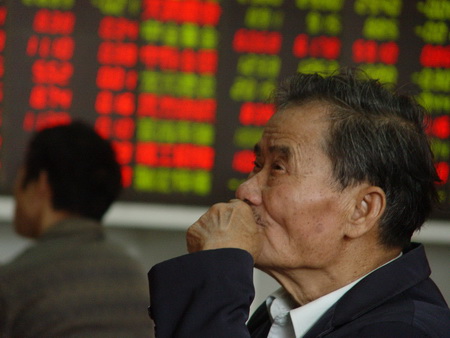Top Biz News
Mainland share rally seen going on to next year
(China Daily/Agencies)
Updated: 2009-12-02 08:04
|
|
|
Investors monitor stock price movement at a brokerage in Haikou, Hainan province. The Shanghai Composite Index has rallied 75 percent so far this year. [China Daily] |
China is on course for a "long-term, multi-year bubble that's not going to burst in 2010", Citigroup Inc's head of China research Lan Xue told reporters in Hong Kong on Monday.
The Shanghai Composite Index fell 6.4 percent last week, the most since the five days ended Aug 14, on concern banks will sell shares after unprecedented lending eroded their capital.
"It's a short-term correction, on the news of the China banks' capital raising," Koo Jae-sang, the Seoul-based chief executive officer of Mirae Asset Global, said. "Long-term, the China growth story is still intact and there's still upside."
The Shanghai Composite has advanced 15 percent this quarter, the third-best performer among 90 indexes tracked by Bloomberg worldwide. Stocks climbed on optimism a 4 trillion yuan ($586 billion) government spending package and an unprecedented 8.9 trillion yuan of new loans will aid the nation's recovery.
China's gross domestic product may expand 8.5 percent this year and 9.3 percent in 2010, based on the median forecasts of 38 economists surveyed by Bloomberg.
Koo, 45, whose company manages the equivalent of $48 billion in assets, said corporate earnings may rise more than 20 percent in 2010, citing analyst estimates. An expected appreciation in the yuan may also draw investors, he said.
The credit expansion helped the Shanghai Composite rally 75 percent this year and home prices in 70 major cities climb at the fastest pace in 14 months in October.
"It's an ongoing domestic demand growth story," said Koo, declining to give his projection for the gain in equities next year, or to name his stock selections. "The rise in corporate earnings convinced me that global investors will once again focus on China."
The Shanghai Composite remains the second-most expensive benchmark index in Asia excluding Japan after the decline last week. The measure is trading at 23 times estimated earnings for 2009, twice the level a year earlier, data compiled by Bloomberg showed.
"If you think about the earnings forecasts, the price-earnings ratio may not be expensive," Koo said.
Risks faced by China's market next year include a slower-than-expected recovery in the US economy and unwinding of so-called dollar carry trades, when investors borrow dollars and purchase higher-yielding assets in other currencies to take advantage of record-low rates in the US, he said.
Growing demand from global pension funds may also benefit China and other emerging markets such as Brazil, he said. Emerging markets account for 30 percent of the global economy, and only make up less than 5 percent of portfolios of global pension funds, he said.
The Chinese mainland accounted for the biggest weighting among Mirae's overseas investments, followed by India, China's Hong Kong SAR, Brazil and Russia as of October, the company said.














